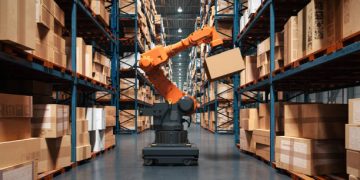The agricultural and manufacturing landscapes in the United States are currently defined by tight profit margins, rising costs, and ongoing debates about the role of tariffs in shaping trade and production. Farmers, agribusiness leaders, and policymakers are grappling with questions about how to balance short-term economic pressures with long-term strategies that will sustain growth and competitiveness.
Carl Zulauf, Ph.D., professor emeritus at The Ohio State University, has spent much of his career studying agricultural policy and commodity markets. In a recent presentation to farmers, lenders, and agribusiness professionals, he provided insights into the challenges of understanding the current environment and how tariffs influence both production and consumption.
Zulauf emphasized that tariffs operate as a tax on imports, directly raising the price of goods. “The first question an economist looking at the current situation would ask is if the tariff is high enough to get people to think about buying American goods,” he explained. Using a 50% tariff as an example, he noted that American producers would typically raise their prices by a similar amount, since it would be economically irrational to do otherwise. While this example illustrates the mechanics of tariffs, he noted that the real policy question centers on proposed levels of around 15% and whether such a rate can meaningfully alter production decisions.
According to Zulauf, the impact of a 15% tariff depends heavily on the type of product. For certain goods, the tariff may encourage domestic production, but for others, foreign producers may still deliver products at lower prices even after tariffs are applied. “It is not a given that a 15% tariff will necessarily cause American businesses to produce the product,” he said. “That’s where the debate is right now among American companies. They are asking, can we produce competitively with a 15% tariff in place?”
Zulauf also spoke about the broader challenges of conducting economic analysis in today’s environment. He explained that the scientific method in economics typically involves changing one variable at a time while holding others constant. This allows researchers to trace the consequences of incremental adjustments. In the current climate, however, multiple variables—tariffs, consumer behavior, labor trends, technology, and more—are changing simultaneously, making precise analysis nearly impossible. Instead, he recommended focusing on timeless economic principles: the law of supply (as prices rise, producers make more), the law of demand (as prices rise, consumers buy less), and the importance of incentives in shaping behavior.
The discussion also touched on broader economic pressures beyond trade. Since 2000, U.S. households have spent about 1.3% more of their income on food, reducing funds available for discretionary spending and slowing overall economic growth. At the same time, productivity levels have remained stagnant for decades, even as technology has changed how work is performed. The labor force is also shrinking, with large numbers of baby boomers retiring, creating tighter labor markets and pushing wages higher. “If productivity is not increasing and the labor force is shrinking, it says to me that labor wage inflation is going to be a big part of this economy for the foreseeable future,” Zulauf noted. This trend has significant implications for inflation management and for Federal Reserve policies on interest rates.
Another area of focus was the structural role of manufacturing in the U.S. economy. Historically, agriculture has benefited from federal protection and farm programs for more than 90 years. Agriculture now represents about 10% of U.S. GDP, a figure similar to today’s share of manufacturing. Manufacturing, however, has declined from 13% of GDP in 2005 to around 10% today, according to the St. Louis Federal Reserve. Zulauf suggested that this shrinking role raises the question of whether manufacturing might require similar policy support in order to preserve its place in the economy. “We are a wealthy enough country that we can probably honestly start to consider if we want to provide special financial support to the manufacturing sector,” he said.
Zulauf highlighted three key long-term consequences of tariffs. First, they can encourage domestic production by raising the relative cost of imports. Second, tariffs act as a tax on consumers, disproportionately affecting lower-income households that spend a larger share of their income on goods. Third, tariffs can create inefficiencies by shielding industries from competitive pressures. “If you put a tariff on, as a producer, you can get away with being more inefficient than you would if you faced the market,” Zulauf explained. Over time, this protection can lead to reduced innovation and productivity, eroding competitiveness.
Ultimately, the debate comes down to trade-offs. “We need to ask ourselves, can a 15% tariff stimulate production? Are Americans willing to accept the trade-offs?” Zulauf said. These trade-offs include higher domestic output, but also the potential for inefficiency and higher consumer costs. The answers, he suggested, will shape not only the future of American agriculture and manufacturing but also the broader trajectory of the U.S. economy.
As margins remain tight for farmers and businesses alike, these questions are taking on heightened importance. With production costs rising, global trade patterns shifting, and economic pressures mounting, decisions about tariffs, taxes, and production strategies will influence the long-term resilience of both rural communities and industrial centers. The path forward will require balancing competitiveness, fairness, and sustainability in an increasingly complex global economy.
#SupplyChainNews #NewsUpdate #TradePolicy #AgricultureEconomy #USManufacturing
















